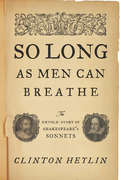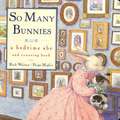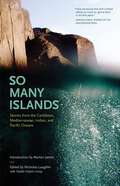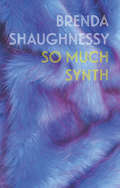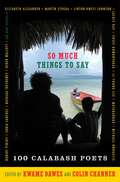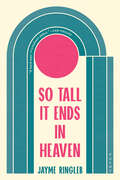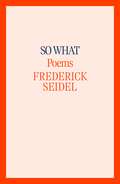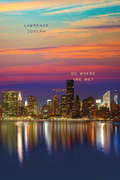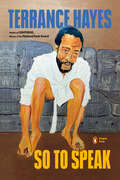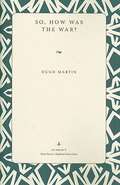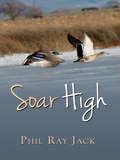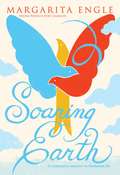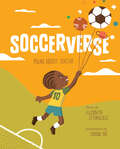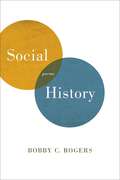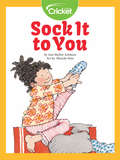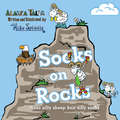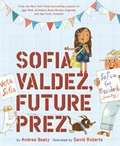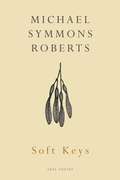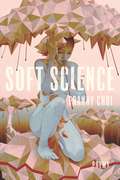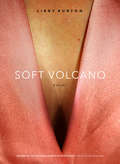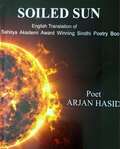- Table View
- List View
So Long as Men Can Breathe
by Clinton HeylinIn this lively, fascinating account of the publication of Shakespeare’sSonnets, noted biographer Clinton Heylin brings their convoluted history to light, beginning with the first complete appearance of theSonnetsin print in May, 1609. He introduces us to the "unholy alliance” involved in this precarious enterprise: Thomas Thorpe, the publisher, a self-described "well wishing adventurer;” George Eld, the printer, heavily embroiled in large-scale pirating; William Aspley, the prestigious bookseller, who mysteriously ended his association with Thorpe soon after. Leaving the calamitous world of Elizabethan publishing, Heylin goes on to chart the many editions of theSonnetsthrough the years and the editorial decisions that led to their present configuration. Passionate, astute, and brilliantly entertaining, the result is a concise and vivid history of perhaps the greatest poetry ever written.
So Long as Men Can Breathe
by Clinton HeylinIn this lively, fascinating account of the publication of Shakespeare's Sonnets, noted biographer Clinton Heylin brings their convoluted history to light, beginning with the first complete appearance of the Sonnets in print in May, 1609. He introduces us to the "unholy alliance" involved in this precarious enterprise: Thomas Thorpe, the publisher, a self-described "well wishing adventurer;" George Eld, the printer, heavily embroiled in large-scale pirating; William Aspley, the prestigious bookseller, who mysteriously ended his association with Thorpe soon after.Leaving the calamitous world of Elizabethan publishing, Heylin goes on to chart the many editions of the Sonnets through the years and the editorial decisions that led to their present configuration. Passionate, astute, and brilliantly entertaining, the result is a concise and vivid history of perhaps the greatest poetry ever written.
So Long as Men Can Breathe
by Clinton HeylinIn this lively, fascinating account of the publication of Shakespeare’s Sonnets, noted biographer Clinton Heylin brings their convoluted history to light, beginning with the first complete appearance of the Sonnets in print in May, 1609. He introduces us to the "unholy alliance” involved in this precarious enterprise: Thomas Thorpe, the publisher, a self-described "well wishing adventurer;” George Eld, the printer, heavily embroiled in large-scale pirating; William Aspley, the prestigious bookseller, who mysteriously ended his association with Thorpe soon after. Leaving the calamitous world of Elizabethan publishing, Heylin goes on to chart the many editions of the Sonnets through the years and the editorial decisions that led to their present configuration. Passionate, astute, and brilliantly entertaining, the result is a concise and vivid history of perhaps the greatest poetry ever written.
So Many Bunnies
by Rick WaltonFrom the Publisher: Follow Mother Rabbit through her rambling house and garden as she tucks in a whole alphabet of baby bunnies, from Abel through Zed. This cozy bedtime book has the comforting familiarity of a lullaby combined with the fundamental concepts toddlers adore. From Children's Literature - Mary Quattlebaum: So Many Bunnies does double-duty. It gets kids hip-hopping into Easter as well as into National Poetry Month, celebrated each April. Rick Dalton's ingenious rhyming text weaves alphabet and counting lessons into a sweet tale of Old Mother Rabbit who lived in a shoe. Unlike her human counterpart, Mother Rabbit knows just what to do and where to tuck her twenty-six sleepy darlings, from "1 was named Abel./He slept on the table" to "26 was named Zed./He slept on the shed." Paige Miglio's soft-toned watercolors are a lovely complement to this lullaby.
So Many Islands: Stories from the Caribbean, Mediterranean, Indian, and Pacific Oceans
by Nicholas Laughlin"The 17 selections of fiction, nonfiction, and poetry in this vibrant collection unite the voices of islanders from around the globe, complete with an excellent introduction by Marlon James...Readers encounter the language, customs, and flora and fauna of many island nations in this delightful and enlightening volume, an invitation to share and experience islands around the globe."--Publishers Weekly, STARRED review"As an anthology, this collection of work is amazingly well-rounded...This collection is a unique and worthy addition to any library...These writers offer a window into genuine, unglazed local life in far-flung, ill-understood parts of the world. It's a gift beyond price."--Sinkhole MagazineCollecting new fiction, essays, and poems from seventeen countries around the world, So Many Islands brings us stories about love and protest, about childhood innocence and the traumas of history, about leaving home and trying to return. These writers's island homes may seem remote on the map, but there is nothing isolated about their compelling, fresh voices.Featuring contributions by authors from Antigua and Barbuda, Barbados, Bermuda, Cyprus, Grenada, Jamaica, Kiribati, Malta, Mauritius, Niue, Rotuma (Fiji), Samoa, Singapore, Saint Lucia, Saint Vincent and the Grenadines, Tonga, and Trinidad and Tobago. So Many Islands is the fourth publication of Peekash Press, an imprint of Akashic Books and Peepal Tree Press, committed to supporting the emergence of new Caribbean writing, and as part of the CaribLit project.From the introduction by Marlon James:I wonder if it is because we island people are surrounded by sea, hemmed in and branching out at once, that we are always in a state of flux. The sea and even the sky are definers and confiners, they have spent millions of years carving space, while at the same time giving us clear openings to map the voyage out. And, today, to be an islander is to live in one place and a thousand, to be part of a family that is way too close by for your business ever to be your own, or way too far but only a remittance cheque away. Or, put another way, to be island people means to be both coming and going. Passing and running, running and passing, as the song goes. Living there, but not always present, travelling or migrating, but never leaving. Or what has never been a new thing, but might turn into a new movement: more and more authors staying put, all the better to let their words wander.
So Much Synth
by Brenda Shaughnessy"Shaughnessy's particular genius . . . is utterly poetic, but essayistic in scope."-The New Yorker"Brenda Shaughnessy's work is a good place to start for any passionate woman feeling daunted by poetry." -Cosmopolitan"Shaughnessy's voice is smart, sexy, self-aware, hip . . . consistently wry, and ever savvy."-Harvard ReviewSubversions of idiom and cliché punctuate Shaughnessy's fourth collection as she approaches middle age and revisits the memories, romances, and music of adolescence. So Much Synth is a brave and ferocious collection composed of equal parts femininity, pain, pleasure, and synthesizer. While Shaughnessy tenderly winces at her youthful excesses, we humbly catch glimpses of our own.From "Never Ever":Late is a synonym for dead which is a euphemismfor ever. Ever is a double-edged word,at once itself and its own opposite: alwaysand always some other time. In the category of cleave, then. To cut and to cling to,somewhat mournfully...Brenda Shaughnessy was born in Okinawa, Japan and grew up in Southern California. She is the author of three books of poetry, including Human Dark with Sugar, winner of the James Laughlin Award and finalist for the National Book Critics Circle Award, and Our Andromeda, which was a New York Times Book Review "100 Notable Books of 2013." She is an assistant professor of English at Rutgers University, Newark, and lives in Brooklyn, New York.
So Much Things to Say: 100 Poets From The First Ten Years Of The Calabash International Literary Festival
by Colin Channer Kwame DawesRobert Pinsky and Derek Walcott anchor this groundbreaking, soulful poetry collection. Contributors include: Robert Pinsky, Derek Walcott, Elizabeth Alexander, Amiri Baraka, Martin Espada, Terrance Hayes, Valzyna Mort, Sonia Sanchez, Linton Kwesi Johnson, Patricia Smith, Saul Williams, Staceyann Chin, and 88 others. Imagine a night of a hundred poets reading their work to an audience of intensely engaged, responsive, and lively people. Imagine the reading taking place under a tent pitched on a grassy lawn that overlooks the Caribbean Sea. Imagine the sun setting, imagine the scent of curried goat and fried fish wafting through the air, imagine the heat, imagine the cool tongue of wind off the sea, imagine a stage like an ancient shrine with a podium artfully pieced together with bamboo, strips of still green wood, leaves, twine, and shells. Imagine one hundred poets, some whose names you know and some you have never heard of, stepping onto the stage, opening their mouths and hearts, and singing out poems of such variety, complexity, beauty, and passion. This is what a poetry reading at the Calabash International Literary Festival is like, and this new anthology provides readers a taste of what this festival offers year after year. Edited by Kwame Dawes and Colin Channer, two of the founders of the festival, this is an exciting example of Calabash's commitment to create a festival that is diverse, inspirational, earthy, and daring each May. This anthology is at once a celebration of ten years of a remarkable literary event as it is a gesture of love to seek ways to continue to fund and support this festival for the future. All profits from this publication will go toward the running of the festival, which remains free and open to the public.
So Tall It Ends in Heaven: Poems
by Jayme RinglebLambda Literary's Most Anticipated September LGBTQIA+ Literature “A hard-won, triumphant debut.”—Carl Phillips, author of Then the War With lush and deeply intimate language, Jayme Ringleb’s debut collection So Tall It Ends in Heaven explores sexuality, estrangement, and the distances we travel for love. Following the end of a marriage, So Tall It Ends in Heaven’s queer southern speaker tries to restore a relationship with his father. His father lives across an ocean, but more keeps them apart than just that: the father rejected his son long ago after learning that his son is gay. The poems search for answers across the United States and Europe, in and out of historical imagination, as the speaker struggles to separate his understanding of devotion and belonging from the constant losses in his life. Drawing from—and subverting—the formal traditions of love poems, parables, and elegies, the collection claims a vital space for one’s own solace. “Nobody will love you / like this poem does,” the speaker says; “Tell this poem / what you want. // Anything.” In turns that are ruminative, funny, and tender, Jayme Ringleb’s debut collection questions what and whom one lets go of by coming out—can love, in all its complexities, ever be uncoupled from grief?
So What: Poems
by Frederick SeidelA bristling, beautiful new collection from “the Dark Prince of American Poetry” (Dwight Garner, The New York Times). In So What, Frederick Seidel writes of speeding his racetrack-only Superbike across the island of Manhattan, “illegal river to river, wap wap wap WOW!” The poet hurtles toward the tenth decade of his life and into the sixth decade of his lightning-rod career, but the path from youth to old age is not a straight one. Throughout this book, Seidel smashes the boundaries of youth and age against each other and stirs up a surge of shotguns and wristwatches, late-blooming love and sex, and flashes of the naked face of American life. At its crest stands the poet, looking over the wreckage and creation, and he proclaims: so what.
So Where Are We?: Poems
by Lawrence Joseph“So where are we?” asks Lawrence Joseph in the title poem of his powerful and moving sixth book of poetry. Beginning where his acclaimed collection Into It left off, amid the worldwide violence unleashed by the World Trade Center terrorist attack, Joseph’s poems—global and historic in scope—boldly encounter the imaginative challenges of our time: issues of political economy, labor and capital, racism and war, and “the point at which / violence becomes ontology, / these endless ambitious experiments in destruction, / a species grief.” Against these realities, Joseph presents an intimate, sensuous language of beauty and love, “a separate / palette kept for each poem,” a constant shifting and fluid play of sound and tone. With incisive intensity, intelligence, emotional force, and fierce, uncompromising vision, Joseph speaks from deep within the truths of poetry’s common language. So Where Are We? is extraordinary new work from one of our most distinctive poets.
So to Speak (Penguin Poets)
by Terrance HayesA powerful, timely, dazzling new collection of poems from Terrance Hayes, the National Book Award–winning author of Lighthead—to be published simultaneously with his latest work of literary criticism, Watch Your Language The three sections of Terrance Hayes&’ seventh collection explore how we see ourselves and our world, mapping the strange and lyrical grammar of thinking and feeling. In &“Watch Your Mouth,&” a tree frog sings to overcome its fear of birds; in &“Watch Your Step: The Kafka Virus,&” a talking cat tells jokes in the Jim Crow South; in &“Watch Your Head,&“ green beans bling in the mouth of Lil Wayne, and Bob Ross paints your portrait. On the one hand, these fabulous fables, American sonnets, quarantine quatrains, and ekphrastic do-it-yourself sestinas animate what Toni Morrison called &“the writerly imagination of a black author who is at some level always conscious of representing one&’s own race.&” On the other hand, these urgent, personal poems contemplate fatherhood, history, and longing with remarkable openness and humanity. So To Speak is the mature, restless work of one of contemporary poetry&’s leading voices.
Soar High
by Phil Ray JackSoar High is a collection of essays and poems addressing the complexities of life's experiences. The topics range from dealing with grief and anger to finding the love that is at the base of our being.
Soaring Earth: A Companion Memoir to Enchanted Air
by Margarita EngleIn this powerful companion to her award-winning memoir Enchanted Air, Young People’s Poet Laureate Margarita Engle recounts her teenage years during the turbulent 1960s. <P><P>Margarita Engle’s childhood straddled two worlds: the lush, welcoming island of Cuba and the lonely, dream-soaked reality of Los Angeles. But the revolution has transformed Cuba into a mystery of impossibility, no longer reachable in real life. Margarita longs to travel the world, yet before she can become independent, she’ll have to start high school. Then the shock waves of war reach America, rippling Margarita’s plans in their wake. Cast into uncertainty, she must grapple with the philosophies of peace, civil rights, freedom of expression, and environmental protection. <P><P>Despite overwhelming circumstances, she finds solace and empowerment through her education. Amid the challenges of adolescence and a world steeped in conflict, Margarita finds hope beyond the struggle, and love in the most unexpected of places.
Soccer Hour
by Carol NeviusSoccer practice begins, and the players stretch, warm up, and work on their footwork, juggling, goal shooting, and keep-away skills before splitting into two teams for an exciting scrimmage. Bill Thomson’s dramatic perspectives and Carol Nevius’ accomplished text demonstrate the training and teamwork that build strong players.
Soccerverse
by Elizabeth SteinglassAn NCTE Notable Poetry BookThe perfect gift for young soccer fans, this picture book features twenty-two imaginative poems that capture all aspects of the world's most popular sport.From the coach who inspires players to fly like the wind, to the shin guard that begs to be donned, to soccer dreams that fill the night, Soccerverse celebrates soccer. Featuring a diverse cast of girls and boys, the poems in this collection cover winning, losing, teamwork, friendships, skills, good sportsmanship, and, most of all, love for the game. Elizabeth Steinglass cleverly incorporates thirteen different poetic forms throughout the book, defining each in a note at the end, and Edson Ikê's bold artwork is as creative as the poems are surprising.
Social History: Poems (Southern Messenger Poets)
by Bobby C. RogersBobby C. Rogers's second collection, Social History, listens hard to the voices of American characters and celebrates the gestures of ordinary life. The long lines of his narrative poems trace the undulations of southern speech, and his careful eye for detail reflects the influence of generations of storytellers, from authors like Robert Penn Warren and Eudora Welty to Rogers's own distant family members, living in "decrepit houses where the floors sagged and the front rooms reeked/of snuff, bitter as the smell off a pile of clods beside an open grave, the scent of time that hadn't succeeded in passing. " In his beguiling evocations of the past, Rogers looks back with affection to the rhythms and rituals of growing up in small-town Tennessee. While his poems speak of a living connection to community and to the earth, they also acknowledge the growing need to question what we have been taught and to break free and make our own way in this world. Graceful and plainspoken, the poems of Social History bear witness to ways of living that, though past, are never truly lost.
Sociolinguistics
by Florian CoulmasIn 28 newly-commissioned chapters, distinguished contributors provide an up-to-date overview of sociolinguistics. This invaluable work of reference, now available in paperback, identifies the most important issues of sociolinguistics, makes primary sources more accessible, and provides orientation for future research. Reflecting the main division within the discipline, the two key sections deal with the social dimensions of language and the linguistic dimensions of society. In addition, there is an introductory section taking issue with the theoretical and methodological foundations of sociolinguistic knowledge which have proved to be especially fruitful in recent years: education, bilingual education, the legal profession and language planning. The Handbook is equipped with a comprehensive bibliography which can be used as a research tool in its own right.
Sock It to You
by Ann Mulloy AshmoreLearn the steps to put on your socks. This poem makes putting on your socks as easy as one, two, three!
Socks On Rocks: These silly sheep knit silly socks (Alaska Tales)
by Mike SpindleDall sheep, of ALL sheep,are sheep that climb on rocks.They like to eat,but hurt their feetuntil they put on socks.Where do they reallyget socks so silly?Meet silly Dall sheep who knit socks and ties. Is it to protect their feet,or do the sheep just want to wear the latest fashions?This charming story was created by noted illustrator and toy designer Mike Spindle, who has illustrated and sculpted such characters as Mickey Mouse, Winnie the Pooh, Care Bears, and the Muppets. The call of the wild brought Mike to Alaska. It was only natural that meet Miles, the Dall Sheep, and the little bear Alaska. These are the beginnings of the Alaska Tales.
Sofia Valdez, Future Prez
by Andrea BeatyEvery morning, Abuelo walks Sofia to school until one day, when Abuelo hurts his ankle at a local landfill and he can no longer do so. Sofia misses her Abuelo and wonders what she can do about the dangerous Mount Trash more. Then she gets an idea the town can turn the slimy mess into a park. She brainstorms and plans and finally works up the courage to go to City Hall only to be told by a clerk that she can’t build a park because she’s just a kid. Sofia is down but not out, and she sets out to prove what one kid can do.
Soft Keys
by Michael Symmons RobertsWhen Corpus won the Whitbread Poetry Award, the judges described it as 'an outstanding, perfectly weighted collection that inspires meditation on the nature of the soul...reading it feels like making an exciting discovery and coming back to an acknowledged classic all at once.' Michael Symmons Roberts' first book, Soft Keys, was the original and most exciting discovery of all. The poems in Soft Keys engage in a search for meaning and order in the everyday and in the extraordinary - a locust officer tracking swarms in an African desert, a hobbyist building a replica of the world out of matchsticks, a chance encounter with the French mystic Simone Weil playing video games in a Torquay arcade... Richly inventive, and written in a wide diversity of poetic forms, Soft Keys looks for those places and moments where the curtain between earth and heaven is thinnest; it was a powerful, arresting debut and the beginning of a remarkable career. As Les Murray said at the time: 'Like Nijinsky, he can leap into the air and stay there. You can reach up and feel the thump of the stage finely persisting in an ankle bone. Roberts is a poet for the new, chastened, unenforcing age of faith that has just dawned.'
Soft Science
by Franny ChoiSoft Science explores queer, Asian American femininity. A series of Turing Test-inspired poems grounds its exploration of questions not just of identity, but of consciousness―how to be tender and feeling and still survive a violent world filled with artificial intelligence and automation. We are dropped straight into the tangled intersections of technology, violence, erasure, agency, gender, and loneliness.
Soft Volcano
by Libby BurtonAt the core of Libby Burton's highly anticipated debut poetry collection, Soft Volcano, are the vivid details underpinning the relationships we hold dearly in our lives. A feminist force, highly wrought and impressionistic, surges from these intensely lyric distillations that show us what we look like standing in the hallways of the museum of lost love—where we stand, how our hair looks, what marks of woe and time are left upon the body after love is strained or abandoned. Soft Volcano is a book of vivid and crushing lyric poems, each one a swell of danger, beauty, and truth.
Soiled Sun: English Translation of Sahitya Akademi Award winning Sindhi Poetry Book MERO SIJJU
by Arjan HasidWe live in multicultural and multilingual world. Many of us speak more than one language. A good amount of literature is being produced in every language. It is important to realize the significance of translating our Sindhi language into English as it is most widely read language in the world. Translating world literature into English is a way to immediately introduce great works to a much, much broader audience. One learns about other cultures, their writing styles, what drives them spiritually and politically, what they eat and wear and how they really feel about the things. We have been making an effort to translate literary works from Sindhi into English. Through translation the works of Sindhi language can reach wider readership. It was an enriching experience to translate Arjan Hasid’s SahityaAkademi winning book entitled “MeroSiju” (Soiled Sun) into English. It is the anthology of Sindhi ghazals. The process of translation is not only difficult but it is demanding as well. Moreover, translation of poetry is really a challenging task. It is not simply thematic concerns or contents that need to be translated but the aesthetics which is the soul of poetry is such a subtle and artistic material that resists all the attempts of translation. We would like to confess here that we have done our best to preserve the content, imagery and other ornamental elements of poetry as much as the English translation of poetry could afford. We are sure that by going through these poems readers will enjoy the intellectual element and creative power of the poet.
